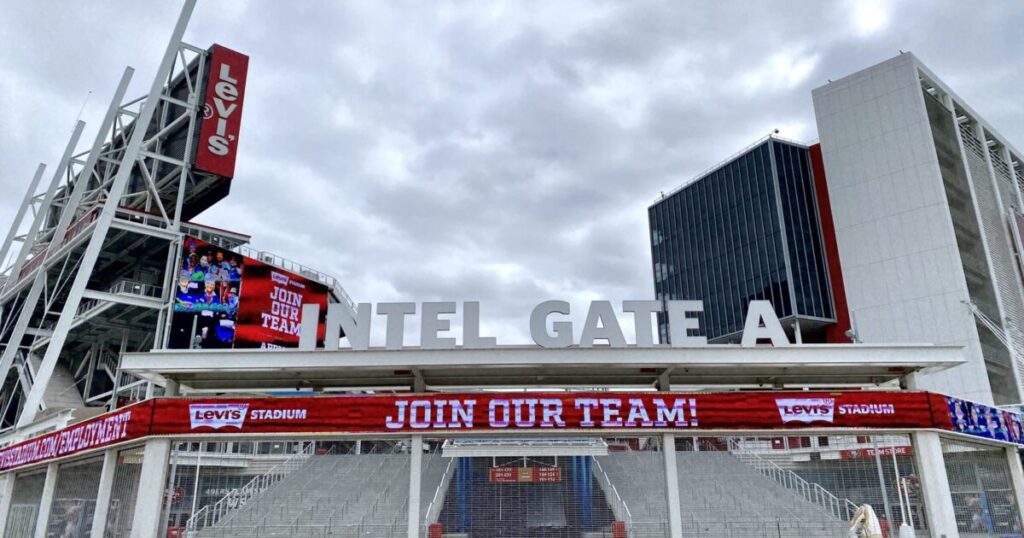The world’s largest sporting event — the FIFA World Cup — is coming to the United States in 2026, and Santa Clara is one of the only cities not breaking the bank to prepare, a data analysis by San José Spotlight shows.
The games will be hosted across the U.S., Mexico and Canada. Nearly all of the 11 U.S. host cities have spent or are planning to spend millions upgrading their stadiums and improving other infrastructure ahead of the games, but Santa Clara’s Measure J from 20210 protects the city’s general fund. San José Spotlight compiled government budgets, meeting recordings and reporting from local news outlets nationwide to analyse how much U.S. taxpayer money is being spent to facilitate the World Cup.
“You have these other places that are taking some risks (and) we’re taking a much more conservative approach,” Santa Clara Councilmember Karen Hardy told San José Spotlight. “That means (our) profit may be lower because of that, but we’ve also lowered our risk.”
Santa Clara has not spent any general fund money on Levi’s Stadium, but the city is looking into marketing and revenue generation opportunities for 2026, while hosting Super Bowl 60 and the World Cup.
The Bay Area Host Committee is paying $25 million to modify the stadium’s field per FIFA regulations. The Santa Clara City Council approved a reimbursement agreement with the host committee in February for most World Cup-related expenses.
Zaileen Janmohamed, president and CEO of the Bay Area Host Committee, said they have multiple partnerships with local businesses, including PNC Bank and NBC Sports. She’s confident the committee will meet its financial targets to host the Super Bowl and World Cup games in 2026.
Every host committee submitted a joint federal funding request of $625 million. On top of that, the Bay Area Host Committee partnered with FIFA World Cup 26 Los Angeles to submit a joint funding request to the state.
“We’re proud to have worked collaboratively to establish a ‘no risk, all reward’ agreement for the city of Santa Clara, ensuring that costs related to public safety will be considered approved expenses and covered by the Bay Area Host Committee,” Janmohamed told San José Spotlight.
Most other host cities lack a similar agreement. For example, the Georgia Legislature sent $29.25 million to the Georgia World Congress Center Authority to cover World Cup costs relating to “public safety, security, transportation and infrastructure expenses and implementation” at Mercedez-Benz Stadium in Atlanta.
Some stadiums are in need of repairs separate from the World Cup, such as NRG Stadium in Houston, Texas, where the Houston Chronicle reported the Harris County Sports and Convention Corporation is spending $35 million on a new roof, video boards and more.
Not every city’s expenditures are finalized. According to Torched, Los Angeles hasn’t set aside any money to help host its World Cup games. Los Angeles Mayor Karen Bass convened members of the Los Angeles County Congressional Delegation March 2025 to discuss the city’s hosting duties for major events, including the World Cup and the 2028 Olympics and Paralympics.
Victor Matheson, professor of economics at the College of the Holy Cross, questioned the justification for some expenditures. For example, Gillette Stadium in Massachusetts is privately owned by the Kraft Group, and the Boston Globe reported that World Cup Boston 2026 host committee is looking for $170 million from local governments and private investors.
Matheson, who specializes in mega sporting events, is skeptical they’ll get the full cost from government funding, as the state has been reluctant to use public money to fund private events.
“There’s no reason that a $5 billion nonprofit company from Switzerland should be receiving a bunch of handouts from Massachusetts taxpayers,” Matheson told San José Spotlight, referring to FIFA.
He added these mega events usually overstate their economic impact because it disregards other tourism that might occur. For Santa Clara, Matheson said he expects San Francisco will see a bigger boost in tourism once again.
Michael Leeds, a Temple University professor who specializes in sports economics, said he isn’t against government spending on mega sports events so long as officials are honest about the real benefits. In the World Cup’s case, hosting brings thousands of people from around the world for entertainment and fun — not a large economic boost.
“If we’re there saying, ‘Hey, wouldn’t this be fun,’ … if the people there say, ‘Yeah, we really want to do this, we think it’d be great,’ then fine,” Leeds told San José Spotlight. “Just don’t try to wrap it up in a package that says we’re going to give a big boost to the local economy.” Tom Knecht, professor of political science specializing in sports politics at Westmont College, said he doesn’t support using taxpayer dollars on stadiums, especially since stadiums are not “public goods.”
Tom Knecht, professor of political science specializing in sports politics at Westmont College, said he doesn’t support using taxpayer dollars on stadiums, especially since stadiums are not “public goods.”
“A dollar spent on one thing is a dollar not spent on another,” Knecht told San José Spotlight. “If you’re going to spend a dollar on the stadium, refurbishing it, that’s a dollar not spent on police or schools.”
Contact B. Sakura Cannestra at [email protected] or @SakuCannestra on X.


